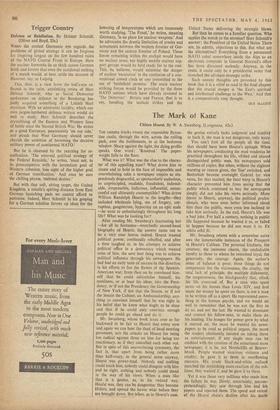Trigger Country
Defence or Retaliation. By Helmut Schmidt. (Oliver and Boyd, 25s.) Defence or Retaliation. By Helmut Schmidt. (Oliver and Boyd, 25s.)
WHEN the coolest Germanic eye regards the problems of global strategy it can be forgiven for lingering longest on the few hundred miles of the NATO Central Front in Europe. Here the nuclear fireworks lie so thick across German fields and forests that even the accidental striking of a match would, at best, settle the account of Hanover, say, or Leipzig.
This, then, is a view from the bull's-eye re- flected in the calm, unblinking retina of Herr Helmut Schmidt, who as Social Democrat spokesman on defence in the Bundestag has justly acquired something of a Liddell Hart mystique. With an admirable lucidity, which our own jargon-lumbered defence writers would do well to study, Herr Schmidt describes the crystallising of the Eastern and Western lines of battle since the Second British War. He writes as a good European, passionately 'on our side,' and pleads that West Germany should never cherish the ambition of becoming the decisive military power of continental NATO.'
But he is obsessed by the yearning for re- unification. The external political strategy of the Federal Republic,' he writes, 'must not, in its preoccupation with the immediate goal of Western cohesion, lose sight of the higher goal of German reunification.' And once he uses the chilling phrase, 'national destiny.'
But with that soft, sitting target, the United Kingdom, a missile's spitting distance from East German launching pads we cannot afford to patronise. Indeed, Herr Schmidt in his groping for a German solution throws up ideas for the lowering of temperatures which are immensely worth studying. 'The Front,' he writes, meaning Germany, 'is no place for nuclear weapons.' And he advocates the drastic limitation of armies and armaments between the western frontier of Ger- many and the eastern frontier of Poland. Those forces remaining within the cockpit would have no nuclear arms, but highly mobile nuclear sup- port groups would be held ready far to the rear. This, he believes, would minimise the danger of nuclear 'escalation' in the confusion of a con- ventional armed clash or one committed to the use of 'battlefield atomics.' The main nuclear striking forces would be provided by the three NATO nations which have already invested in 'The Deterrent': Britain and France, that is to say, handling the tactical strikes and the United States delivering the strategic blows.
But then he comes to a familiar question. Who applies the match to the atomics? Herr Schmidt's answer: the President of the United States. There are, he admits, objections to this. But what are the alternatives? Everything from a permanent NATO cabal somewhere inside the Alps to an electronic computer in General Norstad's office has been discussed uselessly. Anyway, in the event, it could only be a presidential order that launched the ultimate strategic strike.
Such uneasy thoughts are provoked by this book that it is a relief to read in the final chapter that the crucial danger is 'the East's spiritual and intellectual challenge to the West.' And that is a comparatively cosy thought.
GUY ALLCOIT






































 Previous page
Previous page